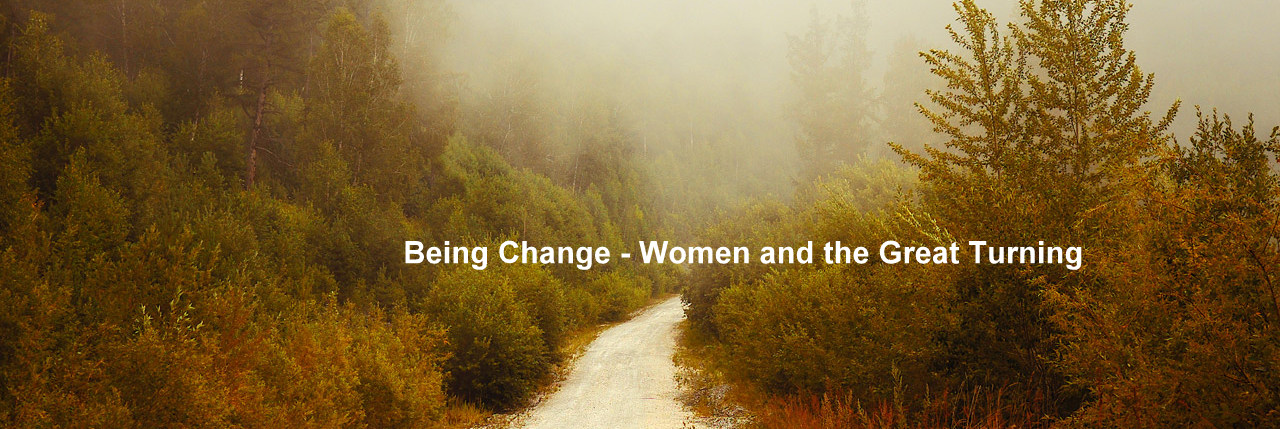
I think I’ve been afraid to speak my deepest truth. Especially since, when I have, it hasn’t been well received. People don’t want to talk about changing and dying, even though that is the nature of all things, even though changing and dying can lead to healing and initiation and rebirth. And even though I believe with all my heart that being able to talk about changing and dying is profoundly necessary for guiding us into the future.
Consider this from The WorldWe Have by Thich Nhat Hanh: “The wisdom offered in the Buddha is that we accept impermanence – our own death and the inevitable death of our civilization. And after having accepted that, we will have peace and strength and an awakening that will bring us together. Then we will have the opportunity…to save our beloved planet.” (pg. 56)
Or this from Coming Back To Life by Joanna Macy: “Pain is the price of consciousness in a threatened and suffering world. It is not only natural, it is an absolutely necessary component of our collective healing…Pain has a purpose: it is a warning signal, designed to trigger remedial action. The problem, therefore, lies not with our pain for the world, but in our repression of it. Our efforts to dodge or dull it surrender us to futility – or in systems’ terms, cut the feedback loop and block effective response.” (pg. 27)
In The Green Boat – Reviving Ourselves In Our Capsized Culture, Mary Pipher talks about the Trauma-To-Transcendence Cycle – a process which “requires us to face the truth, feel the pain of (our) experience, and ultimately transform that pain into action and authenticity. As we move through this cycle, we can acquire the skills we need to overcome our sense of doom and discover our own capacities for transcendent coping…we can find deep within ourselves new strength, deeper courage, and an enriched capacity to love the world.” (pg. 4)
In So Far From Home – Lost and Found In Our Brave New World, Margaret Wheatley writes: “If we fully accept the world as it is – in all its harsh realities – then we can develop the very qualities we need to be in that world and not succumb to that harshness. We find our courage, morality, and gentle, non-aggressive actions by clear seeing and acceptance. As we accept what is, we become people who stand in contrast to what is, freed from the aggression, grasping and confusion of this time. With that clarity, we can contribute things of eternal importance no matter what’s going on around us – how to live exercising our best human qualities, and how to support others to discover these qualities in themselves.” (pg. 11)
Mary Pipher, in another of her books – Writing To Change the World – tells this story:
In September 2003, when I was fifty-five years old, I visited the Holocaust Museum, in Washington, D.C., to view the Anne Frank exhibit. I looked at the cover of her little plaid diary, and at pages of her writing, at her family pictures. Meip Gies, Otto Frank’s employee, who brought food to the family, spoke on video about the people who hid in the attic. She said that Anne had always wanted to know the truth about what was going on. Others would believe the sugar-coated version of Miep’s stories, but Anne would follow her to the door and ask, “What is really happening.?”
Even though Anne Frank ultimately was murdered, she managed (through her writings), in her brief and circumscribed life, to tell the truth and bequeath the gift of hope. She searched for beauty and joy even in the harsh, frightened world of the attic in which her family hid from the Nazis. Her writing lived on to give us all a sense of the potential largesse of the human soul, even in worst-case scenarios. (pg. 20)
We are now facing a potential “Worst-case Scenario.” If pain is the price of consciousness in a threatened and suffering world then perhaps these are the gifts: peace and strength and an awakening that will bring us together…new strength, deeper courage, and an enriched capacity to love the world…(becoming) people who stand in contrast to what is, freed from the aggression, grasping and confusion of this time… the potential largesse of the human soul….
Is it possible? It sounds so compelling I’m willing to go there. And it looks like I’m in good company.
*In the dark times, will there be singing?
Yes. There will be singing about the dark times.
– Bertolt Brecht
